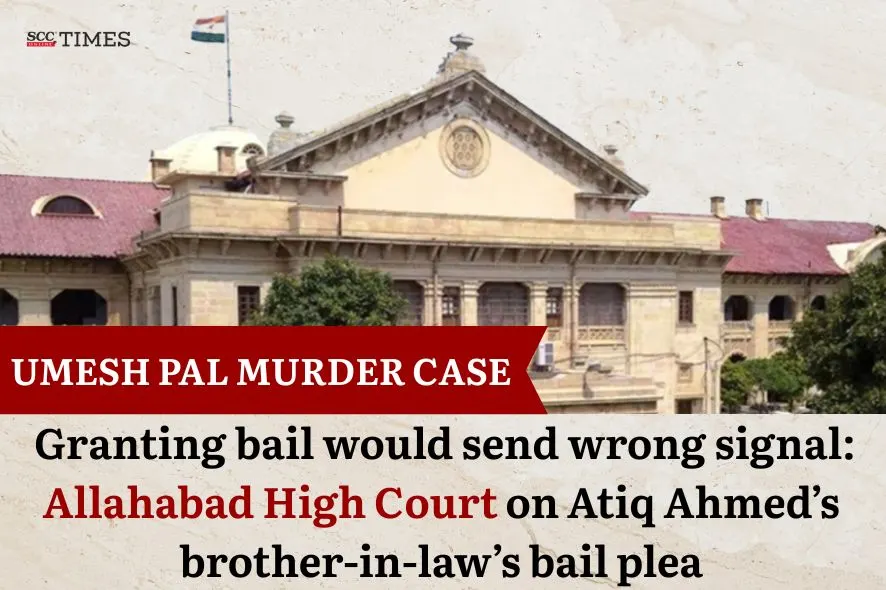Allahabad High Court: In the appeal filed by Akhlakh Ahmad, brother-in-law of Atiq Ahmed, who was accused of collaborating in murder of Umesh Pal (‘deceased’), prime witness in MLA Raju Pal’s murder, challenging the judgment passed by the Special Judge wherein bail was denied to him, a Single Judge Bench of Shekhar Kumar Yadav, J., held that granting bail in a case of such magnitude and societal impact could send a wrong signal and undermine the administration of justice.
Accordingly, the Court rejected the appeal and stated that the possibility of the accused, a relative of a key conspirator, influencing witnesses cannot be ruled out.
Background
In the present case, it was alleged by the complainant, deceased’s wife, that in 2006, he was abducted, beaten, and forced by former MP Atiq Ahmad and his associates to give a statement in their favour in MLA’s murder case. He had allegedly filed an FIR regarding that incident, and proceedings were ongoing daily. He, along with two security guards went to the District Court and upon returning home, son of Atiq Ahmad along with others attacked them with bullets and bombs and they eventually died in the hospital.
The complainant saw the incident on CCTV, rushed out and witnessed the chaos as the assailants fled while firing and threatening the public. Consequently, a case under Sections 147, 148, 149, 302, 307, 506, 34, 120-B of the Penal Code, 1860 (‘IPC’), Section 3 of the Explosive Substances Act 1908, Section 7 of the Criminal Law Amendment Act 2013, and Section 3(2)(v) of the Scheduled Castes and Scheduled Tribes (Prevention of Atrocities) Act 1989 (‘SC/ST Act’) was registered and it was alleged that the murders were conspired by Atiq Ahmad, his wife Shaista Parveen, and his brother Ashraf, and executed through their sons and associates.
The accused argued that he, a government doctor, was being implicated due to his family link with Atiq Ahmad and had no connection with the incident. Per contra, the respondent contended that the statements of co-accused implicated the accused, showing communication among all accused persons through WhatsApp and FaceTime and when the accused’s iPhone was recovered, he refused to provide the password, preventing extraction of digital data. It was further argued that due to the accused’s influence and association with a criminal network, being released on bail posed the real risk of witness intimidation and obstruction of trial.
Analysis and Decision
The Court stressed that in the present case, the accused was charged with collaborating with co-accused to commit the murders of the complainant’s husband and two police guards by openly attacking them on the road in broad daylight with weapons and bombs, spreading terror among the public. The crime committed by the accused was of extremely serious nature and was punishable by death or life imprisonment.
Considering co-accused persons’ statement, the Court noted that Atiq Ahmad and his brother instructed co-conspirators to seek financial assistance from the accused and his nieces and that after murder, Guddu Muslim, the most-wanted bomb specialist, visited his house and was given shelter.
The Court specified that at the given stage, it was important to note whether the material prima facie showed involvement of the accused or not.
Regarding accused’s contention that witness statements were inadmissible, the Court stated that whether the statements were legally admissible or sufficient for conviction was for the Trial Court, however, for forming a prima facie view on bail, the statements of co-accused linking the accused to the conspiracy and providing financial assistance and shelter could not be ignored.
Further, the Court opined that even though bail is the rule, it was not absolute, especially in heinous crimes and Courts needed to balance personal liberty with societal interest, considering the gravity of the offence, severity of punishment, potential influence on witnesses, and likelihood of fleeing justice.
The Court noted accused’s contention that mere recovery of digital video recorder does not establish authenticity and opined that at the bail stage, a detailed examination was not expected and the recovery, coupled with witness statements, forming prima facie material suggested complicity. The Court further stated that the claims of false implication and delay in FIR were matters for trial and at the given stage, it was sufficient that investigation found material linking the accused to the crime.
The Court highlighted that the brutal killing of three persons in broad daylight shook public confidence and created terror in society. The Court further stated that given the exceptionally gruesome way the crime was committed, the public terror it caused, the involvement of multiple accused in a criminal conspiracy, and the severity of the charges, no sufficient grounds to release the accused on bail were found. Thus, the Court rejected the appeal by denying the bail request and stated that
“Granting bail in a case of such magnitude and societal impact could send a wrong signal and undermine the administration of justice. The court must consider the impact that the release of the accused may have on the public and the witnesses. The possibility of the accused, a relative of a key conspirator, influencing witnesses cannot be ruled out.”
[Akhlakh Ahmad @ Ekhlakh Ahmad v. State of UP, 2025 SCC OnLine All 7321, decided on 7-11-2025]
Advocates who appeared in this case :
For the Appellant: Avnish Kumar Srivastava, Bhavya Sahai, Sr. Advocate
For the Respondents: G.A., Praveen Kumar Pandey, Sandeep Kumar Mishra



